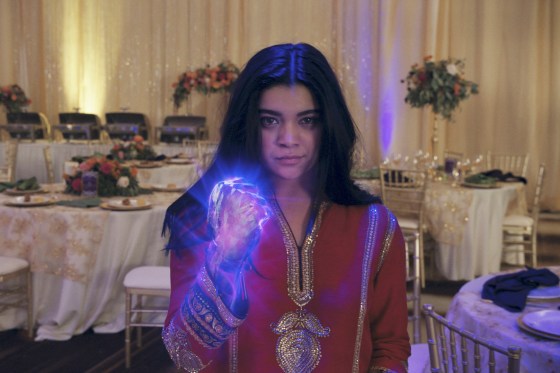There's a scene in the first episode of Disney's "Ms. Marvel" series in which protagonist Kamala Khan, a 16-year-old Pakistani American girl from New Jersey, is about to take her driving test.
"Bismillah," she says while in the driver's seat of the car, as she braces herself for the test to begin. (Spoiler: It does not go well).
The moment is brief. But for many Muslims tuning in, it signifies something they hadn't seen reflected in pop culture before: themselves — in a normal light.
"For many of us, this is the very first time we’ve ever had the opportunity to see a glimpse of our lives on screen," said Sakeina Syed, 21, a freelance writer and student based in Toronto. "From the first episode, the series features so many tiny details that I could never have imagined. Hearing Islamic terms like bismillah, meaning 'in the name of God,' in the episode was something I couldn’t possibly have imagined."
The show, released last week, marks a major milestone for the Muslim community, as it features the first Muslim superhero to lead a title in the Marvel Cinematic Universe.
It follows Kamala (played by Iman Vellani), a teen who idolizes Carol Danvers, aka Captain Marvel, and struggles to fit in at school and home until she’s imbued with superpowers by a bangle passed down from her grandmother.
In an interview with Variety, Vellani said she identifies with Kamala’s story of self-discovery.
“Kamala, at the start of our show is figuring out how religion and culture play into her day-to-day life; it’s not something she neglected, but she doesn’t immediately see the value in it,” she told the publication. “We use phrases from the Quran to guide her in her hero’s journey. Kamala getting her powers and me getting this part really went hand-in-hand. We went on this journey of self-discovery together.”
Fans of the show have felt similarly about seeing a hero that looks like them on the big screen.
"Having a Muslim superhero in such a huge franchise like Marvel means so much," Aisha Imran, 18, who lives in Pakistan, told NBC News in a message. Imran said she feels the show will "help more people to know and understand how beautiful Muslim culture is."
For Syed, news of Disney+'s series brought two conflicting emotions: excitement — but also apprehension.
"Not all representation is necessarily 'good representation' — for years, brown and Muslim roles in franchises like Marvel have usually been relegated to villains or terrorist characters," Syed said. "'Ms. Marvel' feels like a watershed moment for Muslim representation because after decades of being dehumanized in pop culture, we finally get to see a story about us told in a vibrant and meaningful way, backed by a major studio."
...after decades of being dehumanized in pop culture, we finally get to see a story about us told in a vibrant and meaningful way, backed by a major studio."
-Sakeina Syed, 21
Nafisah Atcha, 31, had a similar reaction when the show was greenlit.
"I was a bit hesitant to see how it would be portrayed as the SA [South Asian] community has not always been represented in the best light, but I was willing to be optimistic and see how it turned out," Atcha, who lives in the United Kingdom, said in a message to NBC News.
But Atcha, who identifies as a huge Marvel fan, is pleased with what she's seen so far.
"Seeing someone like you on screen where you understand the inside cultural jokes and see aspects of your family life cannot go unnoticed," she said of the show's significance. "It allows you to have the confidence you can achieve your dreams and feel less isolated."
"It is no secret the way Muslims have been portrayed in the media," she added. "So to see Marvel with all its prestige being a force to help change that is huge."
Zareena Grewal, who serves as Yale University's director of undergrad studies of Ethnicity Race & Migration, said there's no question the show has made an impact on the Muslim community.
"As a Muslim parent of young kids, I have always been extremely strict about the media my kids consume (especially pre-pandemic), mostly because I did not want them to consume the kinds of stereotypical representations of Muslims I was struggling to make sense of a kid watching," she said in an email to NBC News, citing "Back to the Future" as one example. "My kids were genuinely confused, shocked and dismayed to encounter the stereotypical representations of Muslims in 2008’s 'Ironman,' for example. I’ll never forget my 7-year-old turning to me, stunned, saying, 'This is so weird, Muslims as bad guys in a movie? That doesn’t even make any sense!'"
“I had to explain to them that a lot of Hollywood films are full of negative stereotypes of Islam, Muslims and places like Pakistan and Afghanistan and also full of stereotypes about pretty much every minority," she said.
But watching "Ms. Marvel" with her kids brought on different emotions: "excitement, pride, joy and a genuine sense of identification."
Still, Grewal said, "we don’t want to overstate it and treat 'Ms. Marvel' like it's a cutting-edge representation."
The show is "wonderfully done, with three dimensional characters, and is genuinely entertaining. The representations of Islam in 'Ms. Marvel' are a more complex and nuanced and may actually challenge audiences’ preconceived notions," Grewal said. "But it's moving the needle, not shaking the furniture."

